“THE Taliban call me their father”, he told me, when I last met him at his sprawling Darul Uloom Haqqania in Akora Khattak in May 2013. “Afghan Taliban”, he hastened to add, drawing a distinction between Afghan and Pakistan Taliban.
Clearly, Maulana Samiul Haq was trying to distance himself from the Tehreek-i-Taliban Pakistan (TTP) who, he told me privately, were "some different specie".
“I don’t know what we can negotiate with them,” he said, when I asked if he would be interceding with the TTP on behalf of the government.
The western media called his seminary, that his father had built in 1947, as the ‘Jihad university’, which had produced notable graduates leading the Afghan Taliban resistance in Afghanistan, among them the Haqqani network.
But as a person, the 81-year-old Maulana never came across as someone who would teach hate and violence.
The ever-good host, he would offer hospitality to western journalists at his home adjoining Darul Uloom, who would later write unflattering pieces about him and his madressah.
It was largely because of him being mentor to the senior Afghan Taliban leadership that he retained some influence till the very end. US and Afghan ambassadors to Pakistan visited his madrassahs at one point or the other to seek his help in persuading Afghan Taliban to return to the negotiating table.
Last month, a six-member delegation of Afghan Ulema Peace Council met him and urged him to play his role in bringing peace to their war-torn country. It was evident though that the Great Game in Afghanistan was bigger than whatever influence the tall clergyman could wield with his former disciples. His pronouncements never went beyond his usual nuisances of big powers’ failures to play their part.
But he did cherish his impression of being the deal-maker in Afghanistan. For that was perhaps the seemingly only abiding influence remained with him, considering his fast diminishing role as a politician on the national scene.
His own faction of the Jamiat Ulema-Islam had lost ground to the rival JUI-Fazl led by the crafty Maulana Fazlur Rehman. Maulana Sami’s faction was largely confined to his home district. His son and heir-apparent, Maulana Hamidul Haq, the deputy administrator of the Darul Uloom, had managed to win a seat of the National Assembly once as joint candidate of Muttahida Majlis-i-Amal (MMA) in 2002.
That was the time when the chancellor of the Darul Uloom was elected senator on an MMA ticket in 2003, ending his stint in the upper house of parliament in 2009.
Widely seen as having close relations with the establishment, Maulana Sami’s influence and services were always handy whenever called upon. He was elected to the National Assembly, renamed as Majlis-i-Shura, under Gen Ziaul Haq from 1983 to 1985 and soon afterwards was elected to the Senate from 1985 to 1997.
In 2001, soon after the US invasion of Afghanistan, the ever-eager Maulana propped up the Afghan Defence Council, apparently in support of Afghan Taliban, but also to turn up the heat on the streets to help Gen Musharraf regime get a better deal from the Americans.
The council, a conglomeration of religious parties, quickly transformed into the MMA, led by Fazlur Rehman’s JUI, to win the 2002 elections and form government in the Khyber Pakhtunkhwa (KP), then called North-West Frontier Province.
In October 2011, Maulana Sami helped form another alliance of 40-plus religious groups, called the Defa-i-Pakistan Council, that among others included Jamaatud Dawa. Among its aims was to pressure the government to cut off Afghan-bound Nato supplies through Pakistan, oppose drone strikes and trade with our eastern neighbour, India.
The alliance didn’t make the desired splash and fell apart, only to be resurrected in December 2017 to defend “ideological and territorial borders” of the country. The alliance, however, remained largely ineffective and dysfunctional.
But perhaps one of Maulana Sami’s singular most contributions to the nation lay not in educating Taliban warriors or to the national political history, but in his rather brave role in issuing an edict in support of polio immunisation campaign in December 2013.
It was no small thing. Many men and women vaccinators were gunned down by militants in the streets of Peshawar and places across the province. It would be the Maulana who would issue the fatwa, much to Taliban’s chagrin, to give the much-needed religious backing to the campaign facing vicious and violent attacks.
Much can be said against his politics and philosophy of supporting Afghan Taliban and his seminary along the Grand Trunk Road in Nowshera; however, he did leave his mark on the national and regional scene in his own way. His successor Hamidul Haq tends to emulate his father, though he is nowhere near Maulana Sami in political and personal influence terms.
Published in Dawn, November 3rd, 2018

















































